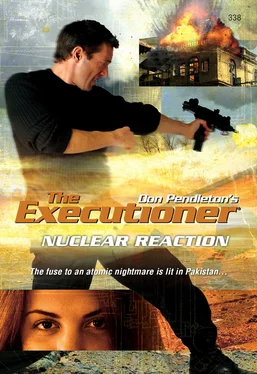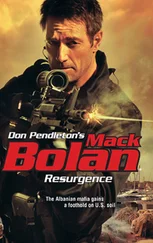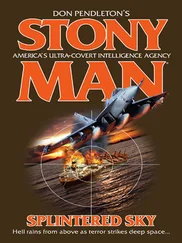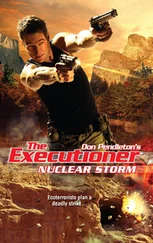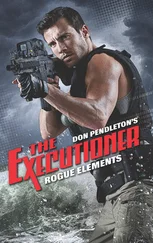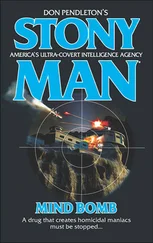“Turn back!” he snapped at Lahti. “Follow them!”
“Follow?” The concept didn’t seem to register.
“Yes, Lahti. Turn the steering wheel. Reverse direction. Follow them!”
“Yes, sir!”
Once Lahti understood an order, he would do as he was told. It would not cross his mind to question a superior. Lahti had found his niche in life, performing simple tasks by rote, relieved that someone else was always close at hand to tell him what came next.
Chandaka braced a hand against the jeep’s dashboard, as Lahti powered through a sharp U-turn. He saw the startled visage of the corporal who drove the second jeep in line. Chandaka pointed after the westbound vehicles, and shouted, “Follow them!”
There was no time to clarify the order. Lahti stood on the accelerator. Something rattled loosely, underneath the jeep’s drab hood, then power surged and they started gaining ground on the retreating vehicles.
Chandaka wished he had a rifleman beside him, but if it came to shooting on the highway, he would simply have to do the job himself. He had a Spanish CETME Model 58 assault rifle propped upright in the narrow space between his knees, butt on the floorboard, and now he hefted it, getting its feel.
He’d never shot a man before, or even shot at one, but training made the difference. When the time came, if it came, Chandaka knew that he would be prepared and would perform as his superiors expected. He was not afraid. Indeed, the feeling he experienced was closer to elation.
At long last, it appeared something was happening.
Lahti was bearing down, gaining ground, but the lieutenant felt obliged to chide him for the sake of feeling in control, being a part of it. “Don’t let them get away,” he ordered.
“No, sir!”
If Lahti took offense, it didn’t show.
The two cars were within one hundred yards, and the gap was narrowing. The army jeeps weren’t much to look at, but they had surprising power. No auto manufactured in the country could outrun them, and among the foreign imports, only certain sports cars or a Mercedes-Benz would leave them in the dust.
If that began to happen, Chandaka was prepared to win the race another way. He gripped his rifle tightly, drew the bolt back and released it, chambering a round. He did not set the safety.
They were already too close for that.
“Faster!” he urged, leaning forward in his seat, straining at the shoulder harness.
“Yes, sir!” the sergeant replied.
Sixty yards. Soon, Chandaka would be able to make out the license number of the second car. At that point, he’d decided he would radio headquarters and report himself in hot pursuit—something he should’ve done already if he had been going strictly by the book. Someone’s secretary could then begin to trace the license and find out who the rabbits were, or more likely come back with the news that he was following a stolen car.
“Get up there, Lahti, so that I can read the license plate!”
“Yes, sir!”
Lahti leaned forward, as if it would help them gain more speed. Chandaka almost smiled at that, but it was frozen on his face as someone in the car ahead of them began firing a submachine gun through its broad rear window, spraying bullets toward Chandaka’s jeep.
THE BLAST OF AUTOMATIC fire surprised Adi Lusila, nearly made him swerve the car into a roadside ditch. One moment, he was concentrating on the highway and Pahlavi in the car ahead of him, trying his best to leave the soldiers in his wake, and then Sanjiv Dushkriti blew the damned back window out, turning the car’s interior into a roaring wind tunnel.
Lusila shouted at Dushkriti. “What possessed you?”
“A great desire to stay alive,” Dushkriti answered, then craned back across his seat to fire another short burst from his L-2 A-3 Sterling submachine gun. One hot cartridge stung Lusila’s ear, then fell into his lap.
“Take care with that!”
“It’s no good from here,” Dushkriti said, by way of an apology, and turned to scramble awkwardly between their seats, climbing into the back. One of his boots glanced off the gearshift as he made the move. Lusila cursed at the grating sound it made.
The grating sound was followed by a loud clang.
“We’re hit,” Dushkriti said, and sounded almost pleased about it. “Do not worry, Adi.”
Idiot, Lusila thought. They were pursued by soldiers, with a foreign stranger driving Darius ahead of them, and now Dushkriti had provoked a running battle that would likely get them killed.
“Don’t worry?” Lusila said with a sneer.
A sudden laugh surprised him, coming out of nowhere and erupting from his throat. He was hysterical. It was the only diagnosis that made any sense at all. If he pulled over now, right where he was, perhaps there was a chance that he could plead insanity. Laugh all the way to jail and through his trial, praying to land in an asylum, rather than a basement torture cell or execution chamber.
Not a chance, Lusila thought.
The soldiers were already shooting at him, thanks to Dushkriti. Even if he stopped and raised his hands, with an armed madman in the car they wouldn’t grant him any time for pleas or explanations.
He would simply have to run, and when escape was clearly an impossibility, beyond the palest shadow of a doubt, then he would have to fight.
And die, of course.
What other outcome could there be when four men stood against some thirty-five or forty?
And it might not even be four men, Lusila realized. Pahlavi and the tall American might keep on going if he stopped to fight. They could use the distraction to escape and save themselves.
To carry on the mission.
Adi Lusila flinched from that idea, as if it were a stinging slap across his face. Pahlavi wouldn’t ask for such a sacrifice. He would give up his own life first, to save his friends. But losing him was not in the best interest of their cause.
A bitter taste had wormed its way onto Lusila’s tongue, matching the stench of cordite in his nostrils. In between the bursts from Dushkriti’s Sterling, he could hear return fire from the jeep behind them, now and then a bullet slamming home into his vehicle.
“Hang on!” he warned, and began to swerve across the two-lane highway, back and forth, hoping his serpentine progress would make it harder for the soldiers in the jeep to kill him, likewise spoiling any shot they might’ve had at Pahlavi and the American up front.
“My stomach!” Dushkriti cried.
“Are you hit?”
“Car sick!”
“So, puke and keep on firing!”
When a new stink filled the car, Lusila gave thanks that the rear window was gone. Let the foul odors from his friend blow back along the highway toward their enemies and sicken them, instead.
Dushkriti finished gagging, rattled off another burst of automatic fire, then growled, “I need another magazine.”
He hunched down in the back seat, fumbling in his jacket pocket, thereby giving Lusila his first clear view of their pursuers since the chase began in earnest. Even as he glimpsed the lead jeep in his rearview mirror, the officer in its front passenger seat shouldered his rifle, aimed and fired as Lusila swerved the car again.
He nearly outsmarted himself, turning into the shot, rather than away from it. The bullet whistled past Dushkriti’s head and clipped a corner of the rearview mirror, then punched through the windshield with a solid crack. Lusila cursed and started swerving more erratically, letting his fear dictate his moves as much as logic.
“Stop!” Dushkriti shouted. “I can’t load the gun!”
“Try harder, then!” Lusila snapped. “They almost took my head off!”
With a sharp metallic clacking sound, Dushkriti mated his magazine with the Sterling’s receiver, then cocked it once more and pushed up on his elbows, preparing to fire.
Читать дальше
